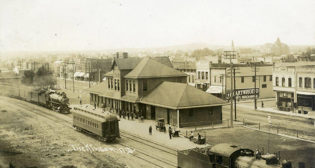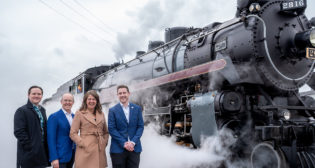
Class I Briefs: BNSF, CN, NS, UP
Written by Marybeth Luczak, Executive Editor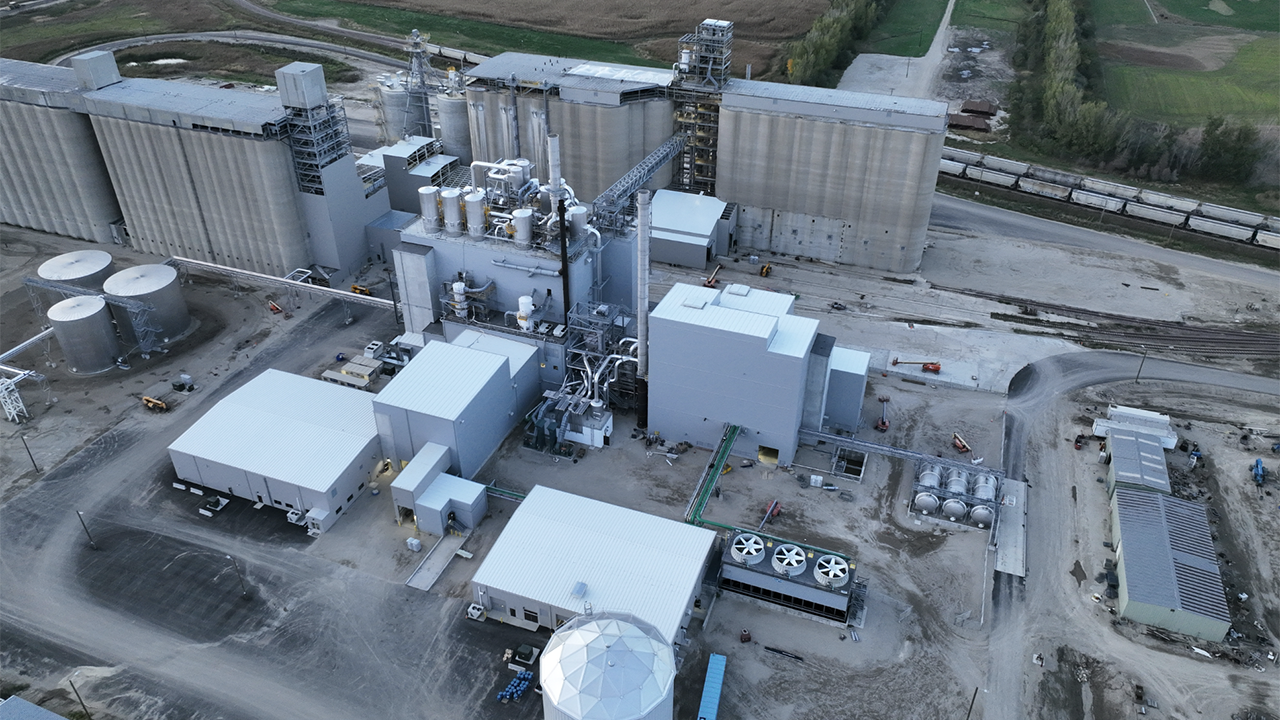
Investments from BNSF customers and supply chain partners totaled more than $4.1 billion in 2023—the largest made in new or expanded facilities in the past five years, the Class I railroad reported April 1. (BNSF Photograph)
BNSF releases 2023 economic development results. Also, CN earns a UPS service award; Norfolk Southern (NS) acquires a Chicago transload and warehouse facility and receives an $8.4 million Georgia Department of Transportation (GDOT) grant for its McDonough passing track improvement project; and Union Pacific (UP) Executive Vice President, Marketing and Sales Kenny Rocker provides a railroad status report.
BNSF
Investments from BNSF customers and supply chain partners totaled more than $4.1 billion in 2023—the largest made in new or expanded facilities in the past five years, the Class I railroad reported April 1. Projects have supported the creation of 4,200-plus new jobs in local communities, according to BNSF.
“We take pride in collaborating with our customers to create customizable rail development solutions that meet their unique needs and enhance and improve their supply chains,” BNSF Assistant Vice President, Economic Development Chris Danos said. “BNSF can also help create sustainable solutions while streamlining logistics costs.”
Highlights of supply chain solutions the railroad helped its customers achieve in 2023 include:
- Cenovus Energy: Following its Jan. 1, 2021, acquisition of the Superior Refinery in Superior, Wis., Cenovus Energy rebuilt and reopened it in 2023. At peak activity levels during reconstruction, more than 2,200 contractors, plus Cenovus staff, were working at the site, according to BNSF. The rail-served refinery produces and ships asphalt, vacuum gas oil, light cycle oil, and LPG products, employing approximately 350 people. Its more than $29.9 million annual payroll contributed to economic growth throughout the Superior-Duluth area, reported the railroad, which added that the refinery pays $2.2 million-plus in property taxes and $48 million in annual spending with contractors and vendors to support operations.
- Green Bison Soy Processing LLC: With an investment of approximately $350 million, ADM & Marathon Petroleum Corporation opened Green Bison Soy Processing, a soybean processing plant in Spiritwood, N.D., to source and process local soybeans to meet increased demand for renewable fuels, specifically renewable green diesel, according to BNSF. The rail-served plant is slated to produce about 600 million pounds of refined soybean oil annually—enough feedstock for about 75 million gallons of renewable green diesel per year. It features more than 22,000 feet of new track and can ship 14,000 carloads of outbound soy meal and vegetable oil annually, said BSNF, which noted that facility supports hundreds of regional jobs and created 75 additional jobs.
In other BNSF news, the Class I is including immersive technology in its mechanical training programs to help keep workers safe and improve role readiness.
CN
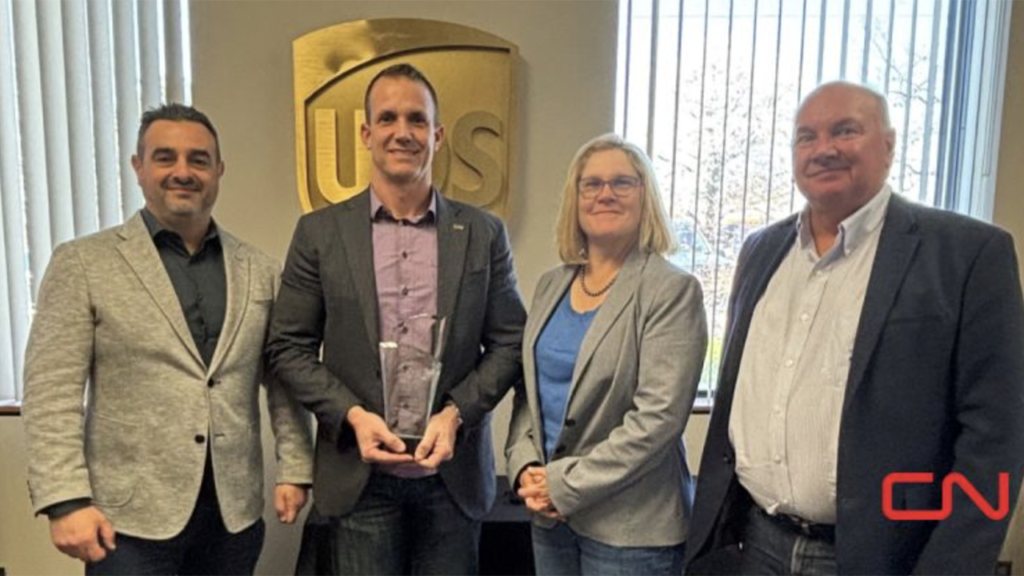
UPS has recognized CN with an award for achieving zero controllable and zero non-controllable service failures in 2023, “[a]midst the hustle and bustle of peak season,” the Canadian Class I reported in an April 1 LinkedIn post.
“Peak season isn’t just a spike in demand; it’s a whirlwind of activity, where every shipment counts, and every delivery deadline is critical,” CN said. “But thanks to the exceptional efforts of our Intermodal Domestic – Sales & Marketing team, our Customer Service team, and the U.S. Operations team, led by Brian Sewell, CN rose to the occasion.”
The award, CN noted, “is a testament to our unwavering commitment to excellence and our ability to thrive even in the most challenging circumstances.”
NS
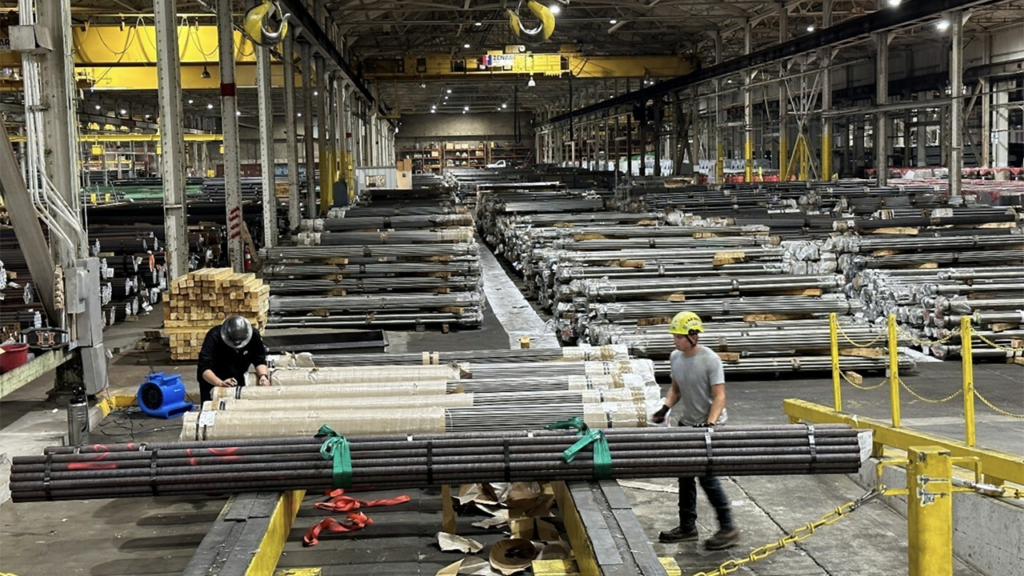
NS on April 2 reported purchasing the Great Lakes Reload (GLR) property, a direct rail- and truck-served transload and warehouse facility in Chicago. The 60-acre GLR site has an outdoor rail capacity of 175 cars; a climate-controlled 386,000 square-foot warehouse with 13 overhead cranes; 18 indoor rail spots; and indoor boxcar docks. It can store and transload all commodity types, including steel, cement and lumber. According to NS, GLR will continue to operate the facility and support operations for the Class I.
“Transloading solutions play a pivotal role in optimizing rail networks, and this partnership exemplifies our dedication to maximizing efficiency and flexibility for our customers,” NS Vice President Business Development and First and Final Mile Markets Stefan Loeb said. “By acquiring the Great Lakes Reload facility, Norfolk Southern gains access to a unique set of end-to-end supply chain solutions, unlocking significant new business opportunities for existing and future Norfolk Southern customers while preserving the successful operations already in place.”
“This long-term strategic partnership will help us grow Norfolk Southern’s first mile and final mile rail traffic into and out of our Great Lakes Terminal,” said Chuck Marias, President of Great Lakes Reloading. “We will continue to provide premium transloading and warehousing services to existing and future customers and are excited to be part of Norfolk Southern’s First and Final Mile Markets network.”
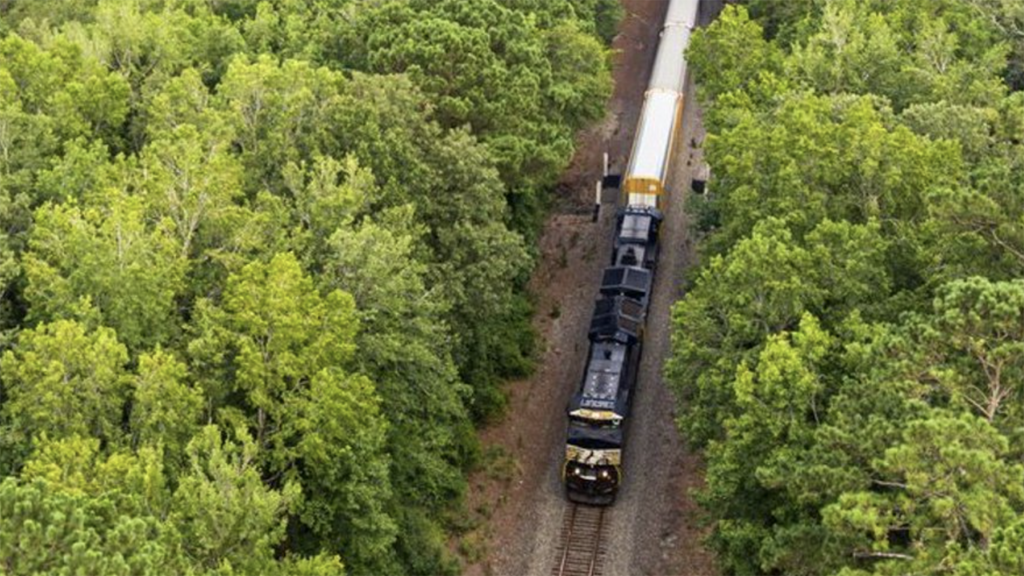
Also on April 2, WSB-2 Atlanta reported that NS has received an $8.4 million grant from GDOT, under the new Georgia Freight Rail Program; it was one of six awarded. The funding will go toward the railroad’s McDonough passing track improvement project between Macon and Atlanta in Henry County. According to GDOT, this is a key freight rail corridor that connects the Georgia Port Authority Garden City Terminal and the metro Atlanta area, the media outlet reported.
Estimated to cost $21 million, GDOT said the project will “allow more efficient use of tracks and reduce road crossings blocked by trains,” WSB-2 Atlanta reported.
“Georgia DOT is excited to announce this first round of grants being made available under this new freight rail funding program and are pleased to award this grant to Norfolk Southern Corporation,” said GDOT Commissioner Russell R. McMurry, according to WSB-2 Atlanta.
“This funding represents a springboard for growth for our Henry County operations, thanks to the invaluable support from Georgia DOT and local officials,” said NS Senior Vice President and Chief Strategy Officer Mike McClellan, according to the media outlet. “It’s a triple win: enhancing service for our local customers, improving main line train access across our 22-state network, and easing congestion along the way. These infrastructure improvements will bolster our operational efficiency while driving economic growth across the region, promising enduring benefits for our communities.”
UP

“As April begins, I am encouraged with the team’s results so far this year,” UP Executive Vice President, Marketing and Sales Kenny Rocker wrote in an April 2 letter to customers. UP CEO Jim Vena’s “multi-year strategy of safety, service and operational excellence is propelling us forward to grow with you. Our safety has started out strong this year—we’re showing year-over-year improvement in both personal injuries and derailments. This progress is due in part to building upon the safety training we have, and introducing the Journey to World-Class Safety classes for all our transportation craft professionals.”
In terms of service, Rocker told customers that UP network operations “remain fluid and several of our key operating metrics are currently at or above levels that we saw back in the second half of 2020.” While he reported that there are “some challenged areas in our network, we remain focused on improving our ramp and terminal performance and are engaged with our interchange partners to resolve issues as quickly as possible.” UP’s resources for locomotives and train crews “continue to remain in good shape,” he added, and “[w]e have adequate supplies to meet customer demand.”
Rocker provided the railroad’s most recent key operating metrics, which he said “have remained solid and consistent over the past month”:
- “AAR weekly carloadings at 156,411.
- “Car velocity holding at 203.
- “Car dwell is steady at 22.9 hours.
- “AAR train speed up to 24.0 mph.”
Rocker also reported on new domestic intermodal service between Inland Empire and Chicago. “Since opening our Inland Empire Intermodal Terminal (IEIT) in 2021, we’ve more than quadrupled the lift capacity in this strategic Southern California import distribution region,” he told customers. “We’ve come a long way since establishing the ‘pop-up’ terminal in our West Colton rail yard. I’m excited to share that beginning yesterday [April 1] we added domestic service to our Global 2 intermodal terminal in the heart of the Chicago metro, supplementing our existing service to Global 4 in Joliet, Ill. We will also extend our interline services for IEIT to more than 20 destination markets on Norfolk Southern, CSX and Canadian National Railway.”
Rocker concluded by thanking customers for choosing UP. “We appreciate your business and are dedicated to provide a safe, reliable service product that you expect,” he said.


